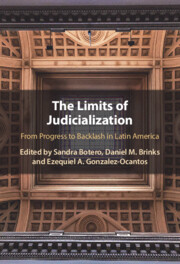Book contents
- The Limits of Judicialization
- The Limits of Judicialization
- Copyright page
- Contents
- Figures
- Tables
- Contributors
- Acknowledgments
- 1 Working in New Political Spaces
- 2 Critical Disconnects
- 3 When Winning in the Courts Is Not Enough
- 4 Forms of Countermovement and Counter-Reform in Latin America
- 5 Backlash against State Strengthening Reforms
- 6 Backlash against Corporate Accountability for Grave Human Rights Violations in Colombia
- 7 Courting Judicial Legitimacy
- 8 Family Ties and Nepotism in the Mexican Federal Judiciary
- 9 Judicial Corruption
- 10 Kickbacks, Crackdown, and Backlash
- 11 Turning Corruption Trials into Political Tools in the Name of Transparency
- 12 Fighting Corruption, Dismantling Democracy
- 13 Prosecutorial Agency, Backlash and Resistance in the Peruvian Chapter of Lava Jato
- Index
- References
5 - Backlash against State Strengthening Reforms
The Rise and Fall of the CICIG in Guatemala
Published online by Cambridge University Press: 11 August 2022
- The Limits of Judicialization
- The Limits of Judicialization
- Copyright page
- Contents
- Figures
- Tables
- Contributors
- Acknowledgments
- 1 Working in New Political Spaces
- 2 Critical Disconnects
- 3 When Winning in the Courts Is Not Enough
- 4 Forms of Countermovement and Counter-Reform in Latin America
- 5 Backlash against State Strengthening Reforms
- 6 Backlash against Corporate Accountability for Grave Human Rights Violations in Colombia
- 7 Courting Judicial Legitimacy
- 8 Family Ties and Nepotism in the Mexican Federal Judiciary
- 9 Judicial Corruption
- 10 Kickbacks, Crackdown, and Backlash
- 11 Turning Corruption Trials into Political Tools in the Name of Transparency
- 12 Fighting Corruption, Dismantling Democracy
- 13 Prosecutorial Agency, Backlash and Resistance in the Peruvian Chapter of Lava Jato
- Index
- References
Summary
The Commission against Impunity in Guatemala was an unprecedented international partnership to build the rule of law in a weak state. Between 2007 and 2019, the CICIG contributed to important legal reforms, the creation of a specialized prosecutor’s office and “high-risk” courts, and investigations of more than sixty criminal networks before being shut down by a president whom it was investigating. The CICIG’s sponsorship by the United Nations and funding from international donors helped it to survive resistance from successive Guatemalan presidents. As the CICIG’s investigations and a stronger Guatemalan state threatened a broader array of previously untouchable powerful domestic actors – including in business, the military, and politics – domestic opposition became more obstructionist. The backlash against the CICIG was ultimately successful when an under-resourced and fragile pro-reform domestic coalition could not replace the international support that had lessened as a result of independent but simultaneous global political trends in the late 2010s. The CICIG experience suggests that rule of law reformers will struggle with backlash from those actors who would lose power and face punishment in a strengthened state and that backlash may be insurmountable as international allies move on.
- Type
- Chapter
- Information
- The Limits of JudicializationFrom Progress to Backlash in Latin America, pp. 115 - 138Publisher: Cambridge University PressPrint publication year: 2022
References
- 2
- Cited by

